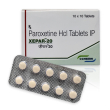
Paxil
Generic Paxil (Paroxetine) is is an antidepressant that belongs to group of drugs called selective serotonin reuptake inhibitors. Paroxetine affects chemicals in the brain that may be unbalanced in people with depression, anxiety, or other disorders. Paroxetine is used to treat depression, including major depressive disorder.
| Package | Per pill | Savings | Price | Order |
|---|---|---|---|---|
| 30 pills | $ 2.14 | $ 64.11 | ||
| 60 pills | $ 1.40 | $ 43.96 savings | $ 84.26 | |
| 90 pills | $ 1.17 | $ 87.22 savings | $ 105.11 | |
| 120 pills | $ 1.05 | $ 130.49 savings | $ 125.95 | |
| 180 pills | $ 0.93 | $ 216.78 savings | $ 167.88 | |
| 270 pills | $ 0.85 | $ 346.88 savings | $ 230.11 | |
| 360 pills | $ 0.81 | $ 477.12 savings | $ 292.20 |
Description
Paroxetine is used to treat certain mental/mood disorders (such as depression, panic attacks, anxiety disorders). It is also used to treat a severe form of premenstrual syndrome (premenstrual dysphoric disorder). Paroxetine belongs to a class of drugs known as selective serotonin reuptake inhibitors (SSRIs). It works by helping to restore the balance of a certain natural substance (serotonin) in the brain.
How To Take
Take this medication by mouth with or without food as directed by your doctor, usually once daily in the morning. Taking this medication with food may decrease nausea. If this medication makes you sleepy during the day, talk to your doctor about taking it in the evening. Swallow the tablets whole. Do not crush or chew the tablets. Doing so can release all of the drug at once, increasing the risk of side effects.
Precaution
Before taking paroxetine, tell your doctor or pharmacist if you are allergic to it; or if you have any other allergies. This product may contain inactive ingredients, which can cause allergic reactions or other problems. Talk to your pharmacist for more details. Before using this medication, tell your doctor or pharmacist your medical history, especially of: personal or family history of bipolar/manic-depressive disorder, personal or family history of suicide attempts, liver problems, kidney problems, seizures, low sodium in the blood, bleeding problems, personal or family history of glaucoma (angle-closure type).




















